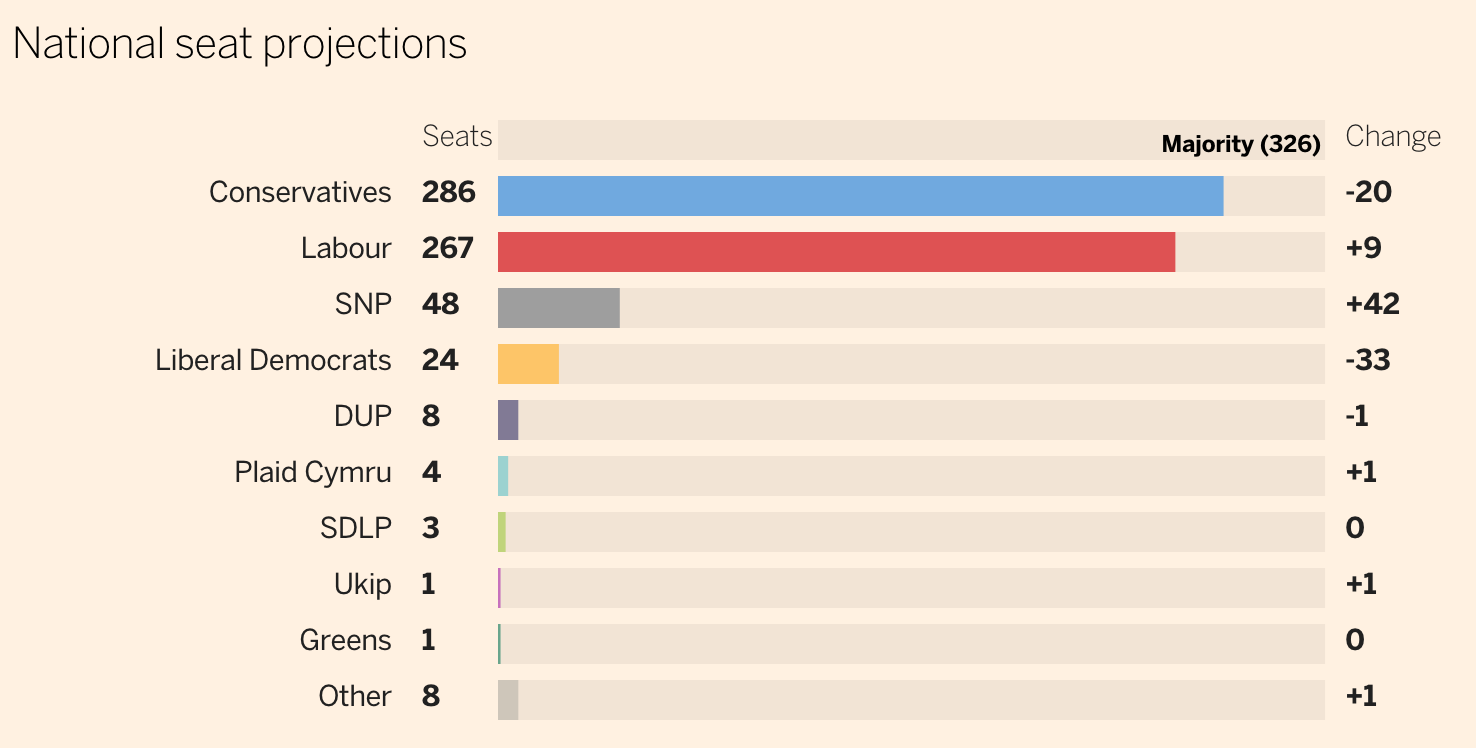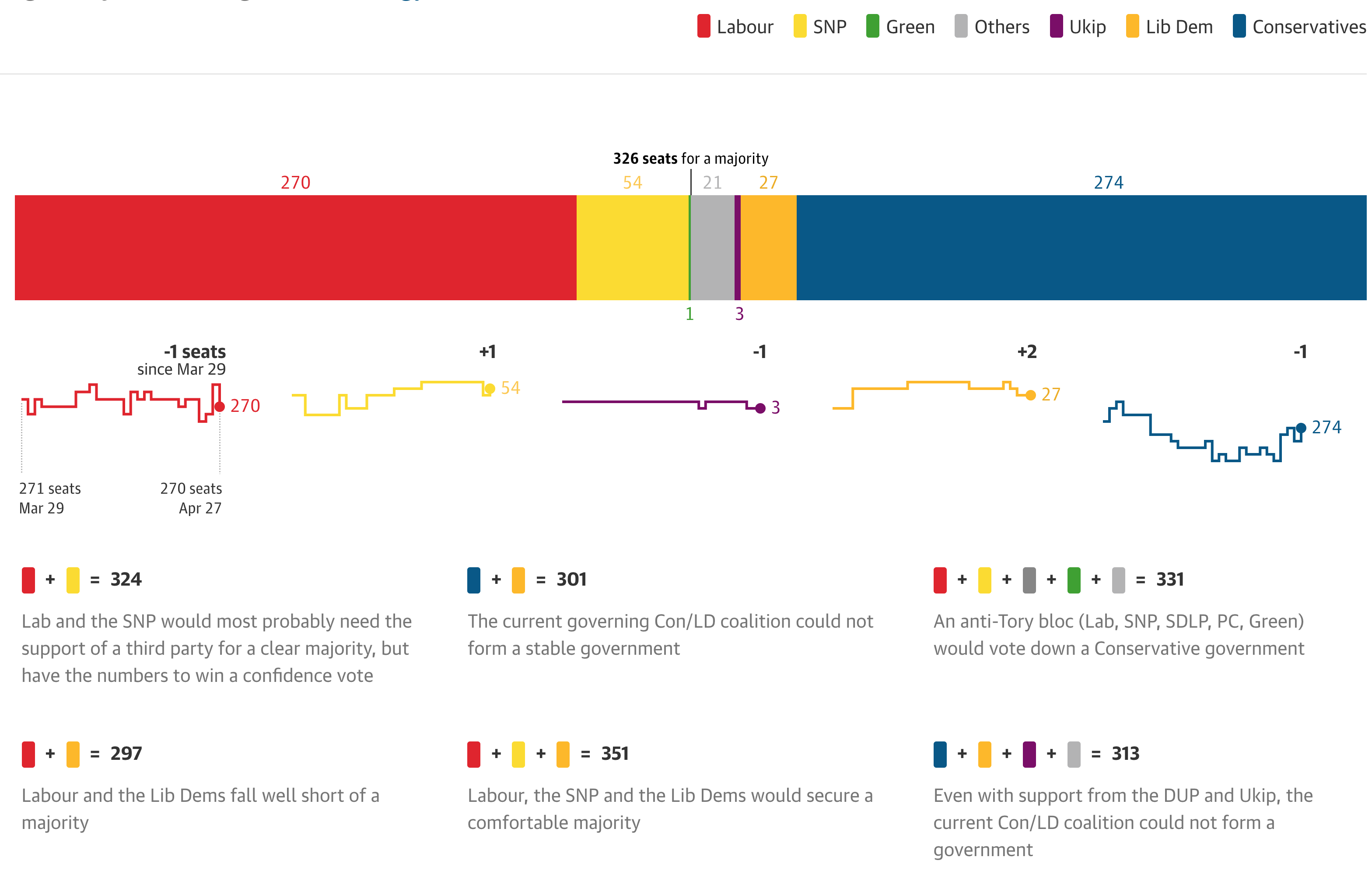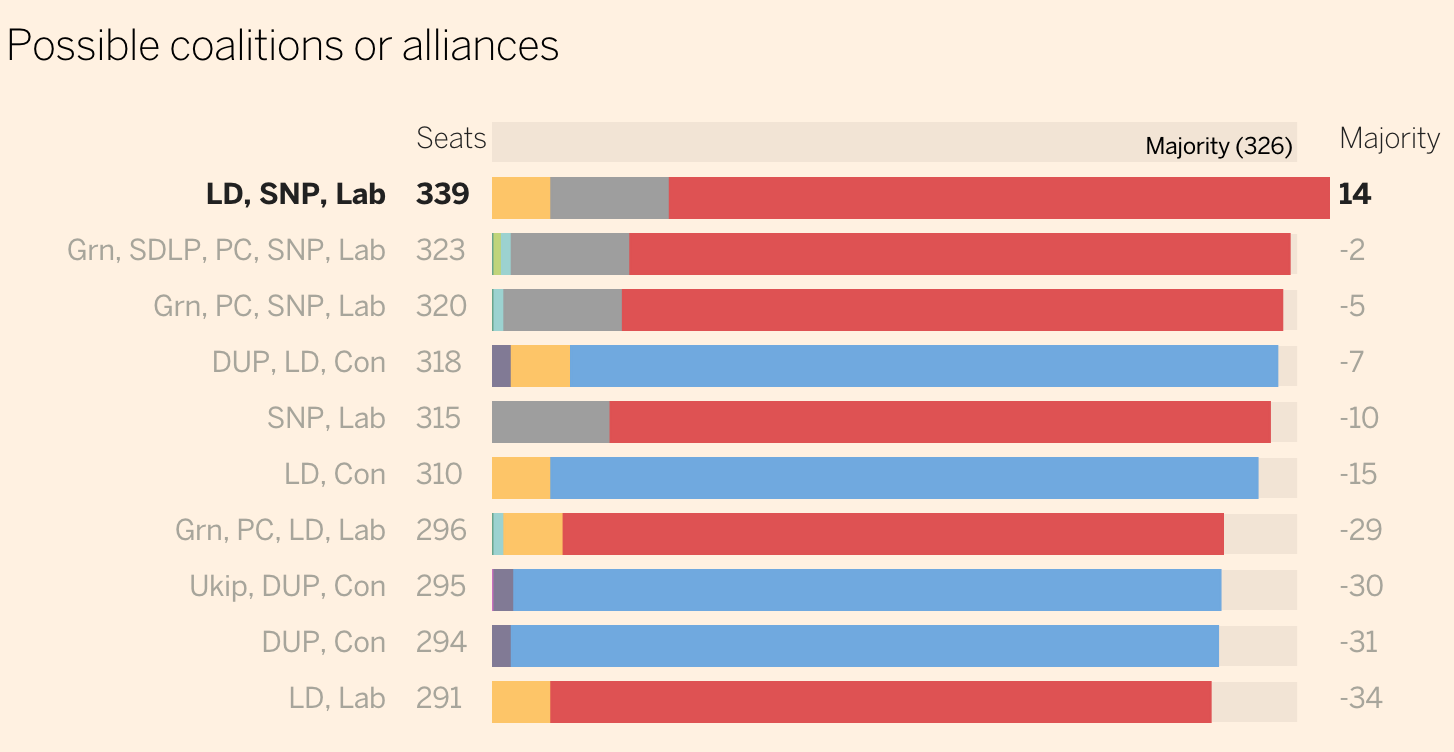Having discussed my fears about majority Labour and Conservative government's, and about the role of nationalism in the 2015 election let me consider the difficult issue of coalition.
Let's be candid: only the wildest optimist now thinks we are not going to have coalition government after May 7. First past the post will, once again, fail to deliver on its promise of majority government, which may be the issue for another blog. For now let's accept the fact that if we are to have a government it will be some sort of coalition.
Of course it may not name itself as such. The FT's summary of election forecasts is more pro-Tory than most and looks like this:
The Guardian's is more middle ground and has this:
Neither need indicate the actual outcome, of course. But assuming they might be in the right area the more pro-Conservative FT forecasts still assembles the options in this fashion:
Curiously, that offers one option of majority government, and that from an alliance currently ruled out by all involved. In truth I do not take anything as said right now on this issue as being reliable: the need to form a government after 7 May will over-rule election posturing before it.
That said though, the fact is that the likely SNP result and its outright opposition to a Conservative led government, which I think is genuine, means any Tory option for forming a government looks uncomfortable (the Liberals and DUP would make weird bed-fellows) and so Labour still looks to have best chance of forming a government after this election. With Green, Plaid and SDLP support, and assuming all the rest of the parties voted consistently against Labour, which may not be true, this rainbow coalition if entirely plausible partners could support a government since in practice 9 MPOs will not be voting in the next House of Commons (five from Sinn Fein, who do not take their seats, and the four in the Speaker's team) and so 322 represents a majority, if one is needed. I remain of the view, as most commentators do, that this, then, is the most likely outcome.
But there are problems and it would be wise to acknowledge them.
The first of these that I very much doubt that the SNP will enter a coalition. So a minority government is possible. I remember such a government in the lat 70s. It was not a great experience and it cost Labour dear. It is hard enough holding political parties together in government. It can be harder still in minority situations were dissent is difficult to express. The demand for loyalty across the spectrum of interests that labour represents will be tough in this situation. I suspect that the Fixed Term Parliament Act will see much more use than anyone expected as a consequence with votes of confidence becoming a tedious part of the scene with the fate of the government depending upon the chance of literally wheeling members in on hospital beds to vote on occasion.
Second, this then raises the ugly issue of what happens if the LibDems and Tories could forma coalition with considerably more seats than Labour but could not pass a Queen's Speech when Labour could. Would such a government be acceptable? The technical answer has to be yes, of course. We elect members of parliament and not parties when casting a vote at constituency level and as such it is, at least technically, only the number of votes of individual MPs that matter when it comes to controlling the House of Commons. In that case a loose alliance could, quite legitimately, outvote a more formal coalition. The question to be asked though is whether or not this would be acceptable to people in the country? The obvious response is that if it is not then the case for electoral reform is made because if this is true then the constituency basis of politics has disappeared and larger constituencies with voting on the basis of party lists would most closely reflect people's opinion of how the electoral system should work. But, would anyone go that far? I think that a potential constitutional crisis around this issue is a very real prospect during the next Parliament.
A third, and quite genuine concern, is that if a minority party were to govern the pool of talent from which ministers might be drawn is relatively small. This worries me: it looks quite likely that Labour will lose a number of its more experienced MPs in Scotland as a result of the popularity of the SNP. This will only exacerbate the problems of forming a government from what will be the smallest grouping of MPs that might have ever sought to do so. Given the scale of the problems that will be faced there is an obvious question to ask, which is whether or not the resulting team will have the necessary experience to deliver effective government?
Not wholly unrelated to this question is that of the House of Lords. I have already discussed on this blog the problem is its current membership will pose for any minority Labour government. It is not unreasonable to think that Labour might need another 125 peers to ensure that it can regularly pass legislation approved by the House of Commons. There is, of course, the backstop of the Parliament Act to rely on, but when Parliamentary management will already be decidedly complicated to reply upon the arcane procedures in this Act to pass legislation could make effective government nigh on impossible. I suspect that a flood of new peers is likely post the election. This may provide Labour with the ministers it needs, but will not help the legitimacy of any government. And it will swell the ranks of the already bloated Lords giving rise to a demand for more reform there as well.
The House of Commons may also need reform. Many of its structures are designed to make the life of a majority government much easier by devolving powers that should belong to the House to the Executive, safe in the knowledge that for a long time the Executive could always get its way in a parliamentary vote. So, for example, it is a current House of Commons rule that no one but the government shall propose a taxation measure. With minority government this may be unacceptable. The time to be allocated to reviewing government spending plans may also have to be significantly increased if, for example, the SNP is to hold a Labour government's feet to the fire, as it says it will. This will, however, require changes to House of Commons Standing Orders and a rewrite the precedent book. Can a minority government survive in the face of such challenges?
And in amongst all that is the almost inevitable complication that a new SNP government in Scotland will, after 2016, hold another referendum on independence with a likelihood, at least on current preferences, for a Yes vote on this occasion.
What, in that case, would happen if it was then decided that electoral reform was essential in the rest of the UK, as would seem logical and desirable in that case? Could that be carried, especially without Scottish votes?
If anyone thinks any government is in for an easy time post 7 May, think again. Just at a constitutional level the issues to be faced are complicated, at best. We will be, as the proverb says, be living in interesting times.
Thanks for reading this post.
You can share this post on social media of your choice by clicking these icons:
There are links to this blog's glossary in the above post that explain technical terms used in it. Follow them for more explanations.
You can subscribe to this blog's daily email here.
And if you would like to support this blog you can, here:





 Buy me a coffee!
Buy me a coffee!

Richard, I’m not so sure we’ll be living in times that are that interesting. My personal feeling is that Westminster is a side-show or, at best, an adjunct to the global financialisation hegemony. We are still living on the lower slopes of a volcano waiting for the next eruption in the financial world – Westminster’s undemocratic antics are dwarfed by this.
On the potential clash between Commons and Lords, and even on that of reduced Commons control, the example I’ve referred to before of the great Australian Prime Minister, Gough Whitlam is very much ad rem.
http://en.m.wikipedia.org/wiki/Gough_Whitlam
Interestingly, the Governor General of Australia, Sir John Kerr, was able to exercise Crown prerogative in a way the monarch he was Viceroy for, our Queen, could not do, in dismissing an elected Prime Minister with a Commons majority, so the parallel probably doesn’t fit in that respect, but the clash between Commons and Senate/Lords could.
What is abundantly clear, as you point out, is that our constitution is broken almost beyond repair, and that we need new organs of government – elected Senate = House of Regions, Regional Parliaments, election on the basis of true proportionality in Multi-member constituencies (a system that has NONETHELESS allowed New Zealand to elect a majority Government), and above all a German-style Fundamental Law, capable of alteration only by a large (80%?) Commons and Senate/Lords vote in favour – a Law setting out the real ground rules, including, I would argue, a need for a Referendum on some matters, among which I would include privatisation of publicly owned assets – NO privatisation without authorisation!
Given the complexities likely to be facing any new Government post May 7th, your final point on the reduced pool of ministerial talent is a serious and significant issue, which the ennobling of some of that talent from among those who will have lost their seats will only partly address. Perhaps the device of a Citizens’Jury, made up of some professional politicians, but also academics, commentators, successful operators in the community, and also ordinary men and women in society, might be tasked with exploring ideas and solutions to assist the Government, rather as the Brandt Commission did for the United Nations?
An excellent summary, Richard. Thanks. Certainly issues abound, whatever happens. But of course, as you mention, the most likely outcome will finally kill off the argument that we don’t (and never did) need electoral reform because first past the post always delivers a “strong”(ie. single party) government. In 2010 the Tories treated the outcome as a one-off aberration – believing, of course, that with the cards stacked even more in their favour than then (eg. an even more rabid, partisan media, more funding, US election “gurus”, and of course, Ed Milliband), they’d walk it this time. But it turns out they won’t, and it wasn’t a one off after all. Add to that the laughable (actually pathetically awful and corrupted) need of any minority government to compensate for the bias injected into the Lords of each previous government of a different persuasion – thereby taking us to a situation of over 1000 Lords after the next (2020) election – and we actually end up with a system that’s not just broken but an absolute joke.
Incidentally, I predict that the any form of unstable/uncertain government after the election will be brutally exploited by the real power in this country (corporate and the 1%) who will effectively use the vacuum created to further their interests even more. As we all now know, they’ve done fantastically well out of the economic/banking crisis. The opportunities created by a democratic one won’t be wasted either. That’s the nature of disaster capitalism.
Agreed
All that and a likely second financial crisis to boot.
Indeed…
I hope there’s a good treasury team
Will SNP MPs continue to abstain on votes which don’t affect Scotland? If they do, then (on either of the above projections) while Labour will be in Government (owing to support on confidence motions from SNP+PC+SDLP+Grn), they will also need LibDem support in some votes.
That would not necessarily be all bad. The LibDems are effectively saying that they will prefer a Conservative to a Labour Government; but if there is a minority Labour Government anyway, it doesn’t follow that they will be obstructive in opposition. It may depend on who is leading them. But it would not be as bad as a position where, with the SNP abstaining, there were a clear Conservative (or even Con+DUP+Ukip) majority. However, while the projections don’t lead to the latter position, they wouldn’t have to move far to get there (I think the FT projection + about 3 extra Conservative MPs would do it).
The SNP have made their position clear, I think